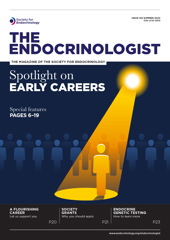Vasileios (Vasilis) Chortis is a clinician scientist in endocrinology, who has just returned to Birmingham after completing a research fellowship at Harvard Medical School in Boston, MA, USA. Here, he talks to The Endocrinologist’s Associate Editor Craig Doig about his stint in the States.
Tell us about yourself and your career so far
I spent most of my clinical and academic training at the University of Birmingham and University Hospitals Birmingham. I trained both in clinical and in more basic and translational research. My clinical studies, in Professor Wiebke Arlt’s lab, included applying mass spectrometry-based steroidomics and metabolomics to dissect adrenal tumour biology and develop new diagnostic tools. The basic and translational research focused on studying adrenal cancer biology in cell line models. I completed my PhD in 2017 and my clinical training as an endocrinologist in 2020.
In 2021, I moved to the USA to work as a post-doctoral research fellow in Dr David Breault’s lab at Boston Children’s Hospital and Harvard Medical School, where I trained in preclinical in vivo models of adrenal development and tumourigenesis. I have just returned to Birmingham and started work as an Associate Professor of Endocrinology at the University of Birmingham and as a Consultant Endocrinologist at University Hospitals Birmingham.
How did move to Boston come about?
'An interesting trend I observed in Boston is that industry is fast-replacing academia as the career destination of preference for most post-docs, to a greater degree than is currently seen in the UK.'
When I finished my PhD, I decided I would like to continue working in translational adrenal research. I started looking for a lab in which I could train in preclinical in vivo models of adrenal disease, with a focus on adrenal tumours. I contacted Dr Breault, who leads one of the world’s leading centres in mouse models of adrenal development and tumourigenesis.
As it happened, his lab had just developed a new genetically engineered model of adrenocortical carcinoma, driven by the two most common mutations in human patients. This provided an excellent opportunity to probe translationally important adrenocortical carcinoma biology questions in a unique in vivo model. I interviewed successfully for a position as a post-doctoral researcher, and made plans to move to Boston at the end of my clinical training. COVID made things more complicated, and I had to defer my move by more than a year, but I was finally able to move there with my wife in 2021.
What were you hoping to gain from a move to the USA?
My main aim was to acquire a new skill set that would allow me to expand the scope of my work as a translational adrenal researcher, acquiring experience in disease-relevant preclinical in vivo models. David Breault’s lab matched my training needs perfectly. So I focused on choosing the right lab for my next step in research rather than the country. Having said that, I always wanted to spend some time living in the USA, both as a personal life experience and to see how a different research system works in practice.
Do USA and UK research environments differ?
The systems are similar, in that most research funding is allocated centrally through competitive applications at a national level. Success rates for major grant applications are similarly low, so funding certainly does not come easily in the USA either. My feeling was that the system in the USA is better at supporting early career researchers and setting them up for success, especially when it comes to clinician scientists. On the other hand, eligibility for many funding schemes in the USA is dependent on citizenship or visa status, so the UK is more open to foreign-born researchers taking their first steps in the country.
The experience of working in a lab in the USA was not too different from a UK one. I think this is much more dependent on the principal investigator than on the country, and I was fortunate to work in very supportive and productive environments in both countries. The time to secure ethical or safety approval to proceed with your planned scientific work is certainly substantially shorter in the USA, especially in animal research.
Finally, an interesting trend I observed in Boston is that industry is fast-replacing academia as the career destination of preference for most post-docs, to a greater degree than is currently seen in the UK.
How has it benefited you?
My experience was overwhelmingly positive. I worked in a very supportive environment that provided high quality training, excellent mentorship, and freedom to explore my research interests and ideas. I certainly feel I have grown a lot in experience and confidence as a clinician scientist as a result of my time in Boston. I have built strong collaborative links that I hope to maintain throughout my career, both at Harvard and with other centres in the USA.
On a personal level, I got a good taste of life in another country, met new friends, and even got to watch a few NBA games! My wife also tells me that New England winters have made me more tolerant of the UK weather, although this effect does seem to wear off gradually.
What are your plans now?
I am currently trying to wrap up the projects I worked on in the USA and complete the publication outputs. Going forward, I will try to secure funding to start my career as an independent investigator, with a focus on the study of adrenal cancer and other adrenal tumours, combining translational and clinical research to improve treatment and diagnostic options for patients with these conditions. I have also been delighted to be able to return to clinical work, a part that I missed during my fellowship in Boston.






